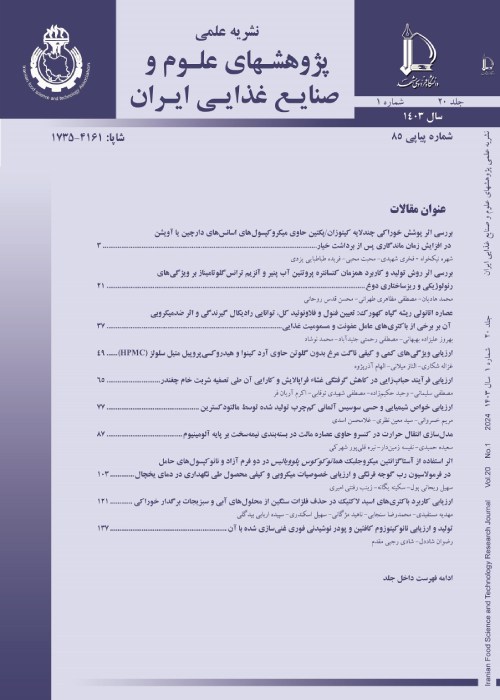Effects of temperature and soluble solid content on the thermo-physical properties of malt extract
Author(s):
Abstract:
Introduction
Malt extract is one of the malt products obtainedfrom concentrations of water soluble extract of grains such as barley and is a proper alternative to white sugar. It has a high diastasis properties andcontainshigh amount of different vitamins specially the group of vitamin B as well as high amount of fermentable sugars. Therefore, malt extract has high nutritional value and is recommended by nutritionist for children and people who are having growth problems. In addition, it has a high potential to be used as sweetening agent in different food products such as cookies, biscuits, ice cream, chocolates etc. Knowledge on the thermo-physical properties of malt extract such as density, specific heat, thermal conductivity as well as thermal diffusivity is highly necessary for the designing of processing equipments, formulation of derived products, heating and chilling processes, and other unit operations such as pasteurization, concentration, dehydration as well as final safety and quality of formulated products. Since, no research work has been reported on thermo-physical properties of malt extract, the aim of this study was to determine different thermal properties of malt extract as well as investigation of the effect of temperature and soluble solid contents (SSC) of the studied properties.Materials And Methods
Barley malt was purchased from local market. 150 gr of malt was first grounded and added to 600ml water at 46°C and stored for 30 minutes. Then, its temperature was increased using a heater to reach 70°C. 300 ml water was then added to the mixture and stored at 70°C for 60 minutes. Then, the mixture was cooled at room temperature and filtered to gain a sweet solution. The obtained solution was concentrated to 60, 70 and 80 degree of Brix for further experiments.Specific heat and thermal conductivity of samples were determined using a differential scanning calorimeter (DSC). DSC is a powerful tool which is able to spontaneously measure different thermal propertiesof samples such as specific heat, thermal conductivity, glass transition temperature, melting point, crystallization point etc. as a function of time and temperature at the desired temperature levels. Density of samples was also measured using a 50ccvolumetric pycnometer. 25 grams of samples were first solved in hot water and then were placed in an isothermal bath to measure the density. Thermal diffusivity of samples was determined using the following equation:∝=k/〖pC〗_p
Results And Discussion
The obtained results on specific heat measurement showed that decreasing SSC from 80 to 60% and increasing the temperature from 25 to 90°C would increase cp from 2.074 to 3.063 kJ/kg°C in a linear manner. Following equations were obtained to predict specific heat as a function of temperature:C_p=2.756.004T R^2=0.893 ¡ X_s=60C_p =2.245 .005T 〖 R〗^2=0.868¡ X_s=70
C_p=2.066 .001T R^2=0.75¡ X_s =80
Thermal conductivity measurements were also showed that decreasing SSC from 80 to 60% and increasing temperature from 25 to 90°C would increase the K values from 0.1196 to 0.347 W/m°C in a linear manner. Increasing temperature would increase molecular movements and therefore it elevates the heat transfer velocity and K increases. Following equations were obtained to predict thermal conductivity as a function of temperature:K=0.152 .003T R^2=0.761¡ X_s=60
K =0.097.002T R^2=0.851¡ X_s=70
K=0.114.001T R^2=0.706¡X_s =80
In order to develop a model to predict thermal conductivity of malt extract based on its soluble solid content and temperature, multiple regressions was used. The obtained model was a two-parameter linear model with R2 of 0.858. The results showed that 1% increase in soluble solid content percentage would cause an increase of 6% in K, while 1% increase in temperature would cause only 49% increase in thermal conductivity value.
Density measurements were also showed that increasing density from 60 to 80% and temperature from 25 to 90°C would increase density of malt extract. Following equations were obtained to predict density as a function of temperature:P=1328.699-0.402T R^2=0.999¡ X_s=60
P=1375.451-0.290T R^2=0.999¡ X_s=70
P=1426.201-0.286T R^2=0.998¡X_s =80
Thermal diffusivity of samples was also determined using indirect method for soluble solid content of 60 to 80 and in the temperature range of 25 to 90°C. It was found that thermal diffusivity would increase linearly by decreasing soluble solid content and increasing temperature. Following equations were obtained to predict thermal diffusivity as a function of temperature:∝=5.176〖×10〗^(-8).049×〖10〗^(-8) T R^2=0.783¡ X_s=60
∝=2.993×〖10〗^(-8).050×〖10〗^(-8) T R^2=0.929¡ X_s=70
∝=3.125×〖10〗^(-8).036×〖10〗^(-8) T R^2=0.94¡X_s =80
The results of the present work were in agreement with the results reported by other researchers confirming that both SSC and temperature have significant effect on thermo-physical properties of malt extract.
Keywords:
Language:
Persian
Published:
Iranian Food Science and Technology Research Journal, Volume:12 Issue: 5, 2017
Pages:
706 to 715
magiran.com/p1655157
دانلود و مطالعه متن این مقاله با یکی از روشهای زیر امکان پذیر است:
اشتراک شخصی
با عضویت و پرداخت آنلاین حق اشتراک یکساله به مبلغ 1,390,000ريال میتوانید 70 عنوان مطلب دانلود کنید!
اشتراک سازمانی
به کتابخانه دانشگاه یا محل کار خود پیشنهاد کنید تا اشتراک سازمانی این پایگاه را برای دسترسی نامحدود همه کاربران به متن مطالب تهیه نمایند!
توجه!
- حق عضویت دریافتی صرف حمایت از نشریات عضو و نگهداری، تکمیل و توسعه مگیران میشود.
- پرداخت حق اشتراک و دانلود مقالات اجازه بازنشر آن در سایر رسانههای چاپی و دیجیتال را به کاربر نمیدهد.
In order to view content subscription is required
Personal subscription
Subscribe magiran.com for 70 € euros via PayPal and download 70 articles during a year.
Organization subscription
Please contact us to subscribe your university or library for unlimited access!


